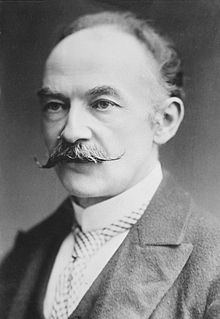Thomas Hardy,
Like Dickens, he was also highly critical of much in Victorian society, though Hardy focused more on a declining rural society.
While Hardy wrote poetry throughout his life, and regarded himself primarily as a poet, his first collection was not published until 1898. Initially therefore he gained fame as the author of such novels as Far from the Madding Crowd (1874), The Mayor of Casterbridge (1886), Tess of the d'Urbervilles (1891), and Jude the Obscure (1895). However, since the 1950s Hardy has been recognized as a major poet, and had a significant influence on The Movement poets of the 1950s and 1960s, including Phillip Larkin.
The bulk of his fictional works, initially published as serials in magazines, were set in the semi-fictional region of Wessex and explored tragic characters struggling against their passions and social circumstances. Hardy's Wessex is based on the medieval Anglo-Saxon kingdom and eventually came to include the counties of Dorset, Wiltshire, Somerset, Devon, Hampshire and much of Berkshire, in south west England.
Although his poems were not initially as well received by his contemporaries as his novels were, Hardy is now recognised as one of the greatest poets of the twentieth century. His verse had a profound influence on later writers, notably Philip Larkin, who included many of Hardy's poems in the edition of the Oxford Book of Twentieth Century English Verse that Larkin edited in 1973.
In a recent biography on Hardy, Claire Tomalin argues that Hardy became a truly great English poet after the death of his first wife, Emma, beginning with the elegies he wrote in her memory. Tomalin declares these poems among "the finest and strangest celebrations of the dead in English poetry.
Like Dickens, he was also highly critical of much in Victorian society, though Hardy focused more on a declining rural society.
While Hardy wrote poetry throughout his life, and regarded himself primarily as a poet, his first collection was not published until 1898. Initially therefore he gained fame as the author of such novels as Far from the Madding Crowd (1874), The Mayor of Casterbridge (1886), Tess of the d'Urbervilles (1891), and Jude the Obscure (1895). However, since the 1950s Hardy has been recognized as a major poet, and had a significant influence on The Movement poets of the 1950s and 1960s, including Phillip Larkin.
The bulk of his fictional works, initially published as serials in magazines, were set in the semi-fictional region of Wessex and explored tragic characters struggling against their passions and social circumstances. Hardy's Wessex is based on the medieval Anglo-Saxon kingdom and eventually came to include the counties of Dorset, Wiltshire, Somerset, Devon, Hampshire and much of Berkshire, in south west England.
Poetry
- For the full text of several poems, see the External links section
Although his poems were not initially as well received by his contemporaries as his novels were, Hardy is now recognised as one of the greatest poets of the twentieth century. His verse had a profound influence on later writers, notably Philip Larkin, who included many of Hardy's poems in the edition of the Oxford Book of Twentieth Century English Verse that Larkin edited in 1973.
In a recent biography on Hardy, Claire Tomalin argues that Hardy became a truly great English poet after the death of his first wife, Emma, beginning with the elegies he wrote in her memory. Tomalin declares these poems among "the finest and strangest celebrations of the dead in English poetry.

No comments:
Post a Comment